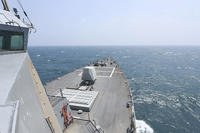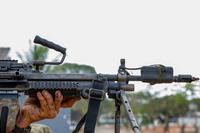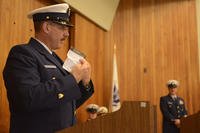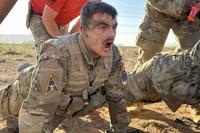Raytheon is testing a new laser-guided 155mm artillery shell which adds laser-designation to GPS guidance in order to provide more targeting options and better pinpoint targets on-the-move, company officials said.
The new Excalibur S 155 round, which was recently test-fired at Yuma Proving Grounds, Ariz., allows the munition to alter course in flight toward emerging or moving targets.
“Raytheon missile systems is investing in a dual-mode Excalibur variant called Excalibur S. It maintains its GPS guidance system but also adds a laser spot tracker which is a seeker that will detect laser energy from a laser designator and guide to that energy spot on a target,” said Paul Daniels, business development lead, Excalibur, Raytheon.
In the event that a target location needs to be updated or corrected, the round is engineered to switch from GPS guidance to semi-active laser technology in flight, Daniels explained.
“With the laser-guided weapon you just have to get the weapon in the vicinity of the target where the seeker can see the target. Then it will guide to it,” he added.
The new Excalibur S is designed with a mind to operating in GPS-denied environments or scenarios where GPS signals are degraded. The weapon has a range out to 40 kilometers, Daniels said.
The laser seeker can zero in on a laser-spot coming from an air or ground laser-designator which illuminates or “paints” the target for the weapon. Much like the purely GPS-guided Excalibur 55m munition, the semi-active laser-guided round is accurate to within 2-meters of what’s called “miss-distance,” Daniels explained.
During a recent test at Yuma Proving Grounds, Ariz., the Excalibur S was fired from an Army howitzer in what was described as a very harsh gunfire environment.
“The projectile was told to go to a GPS grid coordinate. When the laser was turned on the GPS handed over to the laser seeker successfully and then it saw a target that was not at the initial grid. The target had to maneuver to that new location and did so successfully,” Daniels.
Raytheon plans additional tests for the Excalibur S which will fire the round in even more challenging environments. The next step will be for the Army to decide whether they want to further develop the round and put it through qualification testing of some kind, he explained.
At the same time, Raytheon is also offering a variant of the Excalibur S to the Navy to fire from its ship-based 5-inch guns. The Naval 5-inch variant would use the same electronics used on the 155m Excalibur found for a 127m, 5-inch gun projectile.
“The existing 5-inch projectile for destroyers and cruisers has a range of 13 miles and no precision. We are more than doubling that range and providing less than 2-meters miss distance. The warhead is being resized and the control actuation system has to be repackaged. The guidance and navigation unit with all the electronics could be 100 percent re-used with complete carryover from the Army program to the Navy program,” Daniels added.







